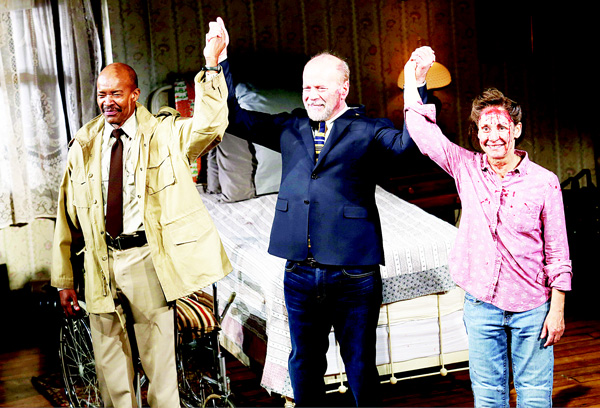17/11/2015
17/11/2015
 From left, Leon Addison Brown, Bruce Willis, and Laurie Metcalf appear on stage at the opening night curtain call of ‘Misery’ on Broadway at the Broadhurst Theatre on Nov 15, in New York. (AP)
From left, Leon Addison Brown, Bruce Willis, and Laurie Metcalf appear on stage at the opening night curtain call of ‘Misery’ on Broadway at the Broadhurst Theatre on Nov 15, in New York. (AP)NEW YORK, Nov 16, (Agencies): In the end, “Misery” isn’t total misery. It’s just weird. Apart from the fact that it’s a completely unnecessary adaptation, you oddly start to root for the monster, not the bona fide action hero.
That’s because Bruce Willis makes an appallingly ill-conceived Broadway debut in the thriller that opened Sunday at the Broadhurst Theatre. But Laurie Metcalf rescues the “Die Hard” stud by doing enough good acting for both of them.
Nowhere this season on Broadway is there an acting gulf as wide between two leads than here. Willis has decided to squint a lot, mumble and rely on some “Moonlighting”-era quipping, not to mention an earpiece that feeds him lines. The artificial snow that falls on the set has more dynamism.
Metcalf, who some will know from the TV show “Roseanne,” is a Steppenwolf Theatre Company veteran who plays a towering psychotic — girlish one minute and inhuman the next. She’s so good that she starts making sense. She’s so good you care about her, even if she’s waving a gun menacingly.
The action takes place in a lonely, snow-encased Colorado town. While driving on an icy road, novelist Paul Sheldon crashes and is pinned in his car, with a new manuscript tucked away in his nearby briefcase.
Metcalf plays Annie Wilkes, his so-called No. 1 fan who obsesses over Sheldon’s nine-book series about a 19th century English heroine named Misery. Wilkes finds poor Sheldon, frees him from the car and takes him to her home to nurse him back to health.
The play opens here, with Metcalf the ever-devoted fan-girl and Willis in bed looking like he’s been hit by a train. It’s hard to act when you’re immobile but Willis doesn’t try, merely groaning a lot. After all, deep down, he knows this is Metcalf’s show.
Wilkes’ down-home likeability soon vanishes when she reads both Sheldon’s latest manuscript and then his new book in which the author has killed off Misery. She forces him — using torture and drugs — to literally write for his life.
Dark
William Goldman penned the 1990 film version of Stephen King’s novel — starring James Caan and Kathy Bates, who won an Academy Award — and adapted the book for the stage. It’s oddly dark and funny at the same time. (He includes the famous scene in which a sledgehammer is used on Sheldon’s ankles, and it actually produces cheers from the audience. Go figure.)
Director Will Frears has managed to keep the action boiling like a noir thriller, with the actors moving cinematically through David Korins’ nifty house on a turntable set. Lighting designer David Weiner works overtime to create daylight and nighttime for the months Sheldon is held, and Michael Friedman wrote intriguing music that is woven onto the dialogue and scenes.
Everyone is doing their best here except one guy, the one drawing the high ticket prices. But apparently no one told Willis he was in a thriller; he seems to think he’s in a quirky romantic comedy. Maybe someone should tell him in his earpiece.
The eek! factor is largely missing from “Misery,” starring a laid-back Bruce Willis as the bed-bound author held hostage by his “greatest fan,” played here by Laurie Metcalfe. Despite the physical intimacy imposed by its stage setting, William Goldman’s theatrical version of the 1987 Stephen King novel lacks the stifling sense of claustrophobia that made Rob Reiner’s 1990 movie version starring Kathy Bates and James Caan so unnerving. Or maybe the atmosphere of fear and dread was just wiped out by the show’s undercurrents of arch humor.
Woe to the bestselling author of pop fiction who attempts to break out of his successful rut and become “a serious writer of serious books.” Faithful to King’s personal nightmare, Goldman brings the wrath of the gods (and his fans) down on Paul Sheldon (Willis) when he tries to go straight.
In the winter of 1987 (well before cell phones and cordless hand phones), just outside Silver Creek in rural Colorado (where he always goes to finish his books), Paul crashes his car. He suffers two broken legs and a dislocated shoulder, and would have died had Annie Wilkes (Metcalf) not pulled him out of the wreckage and hauled him home.
Annie’s home, which she inherited from her mother, is a study in arrested psychological development. David Korins’ elaborate Victorian dollhouse of a set moves on a turntable, revealing multiple rooms, all meticulously furnished with dated early-depression fussiness. Even the back porch, where Buster (Leon Addison Brown), the folksy sheriff, pays a few ill-advised visits.
Paul learns of his close call when he awakens in pain in Annie’s bed, with both legs in casts and his arm in a sling. As a trained nurse, Annie has performed these medical tasks with ease. And as Paul’s “biggest fan,” as she keeps reminding him, she’s done it all with deep devotion. In gratitude, Paul lets her read the manuscript of his new book, the latest (and final, as it turns out) adventures of his romantic Regency heroine, Misery Chastain.
The bed-bound Paul is a purely reactive role; still, helmer Will Frears lets Willis get away with murder by maintaining his sophisticated-author cool well beyond the point of believability.


